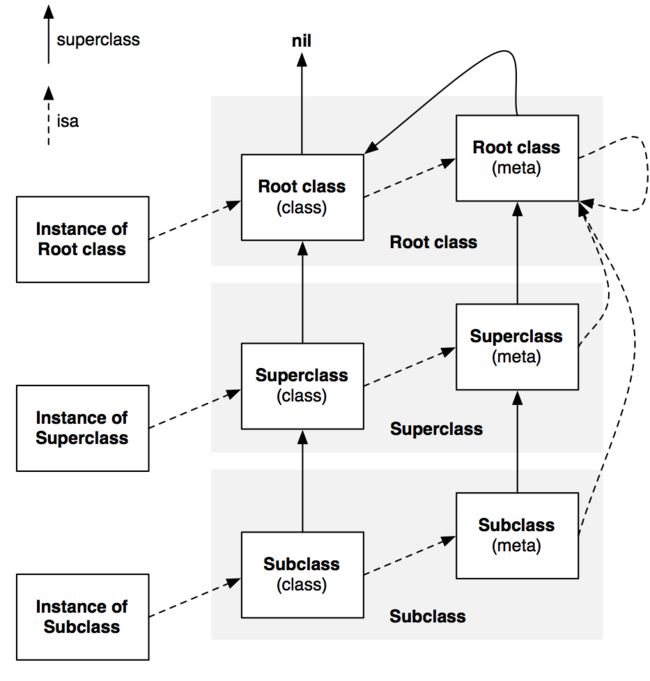一、数据结构
id
/// A pointer to an instance of a class.
typedef struct objc_object *id;
从文档中可知,id是指向objc_object结构体的指针。
objc_object
/// Represents an instance of a class.
struct objc_object {
Class _Nonnull isa OBJC_ISA_AVAILABILITY;
};
objc_object结构体中有一个类型为Class的isa指针。
Class
/// An opaque type that represents an Objective-C class.
typedef struct objc_class *Class;
Class是指向objc_class结构体的指针。
objc_class
struct objc_class {
Class _Nonnull isa OBJC_ISA_AVAILABILITY;
#if !__OBJC2__
Class _Nullable super_class OBJC2_UNAVAILABLE;
const char * _Nonnull name OBJC2_UNAVAILABLE;
long version OBJC2_UNAVAILABLE;
long info OBJC2_UNAVAILABLE;
long instance_size OBJC2_UNAVAILABLE;
struct objc_ivar_list * _Nullable ivars OBJC2_UNAVAILABLE;
struct objc_method_list * _Nullable * _Nullable methodLists OBJC2_UNAVAILABLE;
struct objc_cache * _Nonnull cache OBJC2_UNAVAILABLE;
struct objc_protocol_list * _Nullable protocols OBJC2_UNAVAILABLE;
#endif
} OBJC2_UNAVAILABLE;
/* Use `Class` instead of `struct objc_class *` */
isa:在Objective-C中,所有的类自身也是一个对象,即类对象。在这个类对象里面也有一个isa指针,它指向metaClass(元类)。
super_class:指向该类的父类,如果该类已经是最顶层的根类(如NSObject),则super_class为NULL。
name:这个类的类名。
version:提供类的版本信息,这对于对象的序列化非常有用,它可以让我们识别出不同类定义版本中实例变量布局的改变。
info:类信息,供运行期使用的一些位标识。
instance_size:该类的实例变量大小。
ivars:该类的成员变量链表。
methodLists:方法定义的链表。
protocols:协议链表。
cache:一个接收者对象接收到一个消息时,它会根据isa指针去查找能够响应这个消息的对象。在实际使用中,这个对象只有一部分方法是常用的,很多方法其实很少用或者根本用不上。这种情况下,如果每次消息来时,我们都是methodLists中遍历一遍,性能势必很差。这时,cache就派上用场了。在我们每次调用过一个方法后,这个方法就会被缓存到cache列表中,下次调用的时候runtime就会优先去cache中查找,如果cache没有,才去methodLists中查找方法。这样,对于那些经常用到的方法的调用,但提高了调用的效率。
objc_ivar_list
struct objc_ivar_list {
int ivar_count OBJC2_UNAVAILABLE;
#ifdef __LP64__
int space OBJC2_UNAVAILABLE;
#endif
/* variable length structure */
struct objc_ivar ivar_list[1] OBJC2_UNAVAILABLE;
} OBJC2_UNAVAILABLE;
Ivar
/// An opaque type that represents an instance variable.
typedef struct objc_ivar *Ivar;
objc_ivar
struct objc_ivar {
char * _Nullable ivar_name OBJC2_UNAVAILABLE;
char * _Nullable ivar_type OBJC2_UNAVAILABLE;
int ivar_offset OBJC2_UNAVAILABLE;
#ifdef __LP64__
int space OBJC2_UNAVAILABLE;
#endif
} OBJC2_UNAVAILABLE;
objc_method_list
struct objc_method_list {
struct objc_method_list * _Nullable obsolete OBJC2_UNAVAILABLE;
int method_count OBJC2_UNAVAILABLE;
#ifdef __LP64__
int space OBJC2_UNAVAILABLE;
#endif
/* variable length structure */
struct objc_method method_list[1] OBJC2_UNAVAILABLE;
} OBJC2_UNAVAILABLE;
Method
/// An opaque type that represents a method in a class definition.
typedef struct objc_method *Method;
objc_method
struct objc_method {
SEL _Nonnull method_name OBJC2_UNAVAILABLE;
char * _Nullable method_types OBJC2_UNAVAILABLE;
IMP _Nonnull method_imp OBJC2_UNAVAILABLE;
} OBJC2_UNAVAILABLE;
Cache
typedef struct objc_cache *Cache OBJC2_UNAVAILABLE;
objc_cache
struct objc_cache {
unsigned int mask /* total = mask + 1 */ OBJC2_UNAVAILABLE;
unsigned int occupied OBJC2_UNAVAILABLE;
Method _Nullable buckets[1] OBJC2_UNAVAILABLE;
};
objc_protocol_list
struct objc_protocol_list {
struct objc_protocol_list * _Nullable next;
long count;
__unsafe_unretained Protocol * _Nullable list[1];
};
Protocol
#ifdef __OBJC__
@class Protocol;
#else
typedef struct objc_object Protocol;
#endif
Category
/// An opaque type that represents a category.
typedef struct objc_category *Category;
objc_category
struct objc_category {
char * _Nonnull category_name OBJC2_UNAVAILABLE;
char * _Nonnull class_name OBJC2_UNAVAILABLE;
struct objc_method_list * _Nullable instance_methods OBJC2_UNAVAILABLE;
struct objc_method_list * _Nullable class_methods OBJC2_UNAVAILABLE;
struct objc_protocol_list * _Nullable protocols OBJC2_UNAVAILABLE;
} OBJC2_UNAVAILABLE;
objc_property_t
/// An opaque type that represents an Objective-C declared property.
typedef struct objc_property *objc_property_t;
SEL
/// An opaque type that represents a method selector.
typedef struct objc_selector *SEL;
IMP
/// A pointer to the function of a method implementation.
#if !OBJC_OLD_DISPATCH_PROTOTYPES
typedef void (*IMP)(void /* id, SEL, ... */ );
#else
typedef id _Nullable (*IMP)(id _Nonnull, SEL _Nonnull, ...);
#endif
二、方法
class
// Returns the name of a class.
const char * _Nonnull class_getName(Class _Nullable cls)
// Returns the superclass of a class.
Class _Nullable class_getSuperclass(Class _Nullable cls)
// Returns the size of instances of a class.
size_t class_getInstanceSize(Class _Nullable cls)
// Describes the instance variables declared by a class.
// Any instance variables declared by superclasses are not included.
Ivar _Nonnull * _Nullable class_copyIvarList(Class _Nullable cls, unsigned int * _Nullable outCount)
// Describes the properties declared by a class.
// Any properties declared by superclasses are not included.
objc_property_t _Nonnull * _Nullable class_copyPropertyList(Class _Nullable cls, unsigned int * _Nullable outCount)
// Adds a new method to a class with a given name and implementation.
BOOL class_addMethod(Class _Nullable cls, SEL _Nonnull name, IMP _Nonnull imp, const char * _Nullable types)
// Describes the instance methods implemented by a class.
Method _Nonnull * _Nullable class_copyMethodList(Class _Nullable cls, unsigned int * _Nullable outCount)
ivar
// Returns the name of an instance variable.
const char * _Nullable ivar_getName(Ivar _Nonnull v)
// Returns the type string of an instance variable.
const char * _Nullable ivar_getTypeEncoding(Ivar _Nonnull v)
// Returns the offset of an instance variable.
ptrdiff_t ivar_getOffset(Ivar _Nonnull v)
property
// Returns the name of a property.
const char * _Nonnull property_getName(objc_property_t _Nonnull property)
SEL
const char * _Nonnull sel_getName(SEL _Nonnull sel)
SEL _Nonnull sel_registerName(const char * _Nonnull str)
